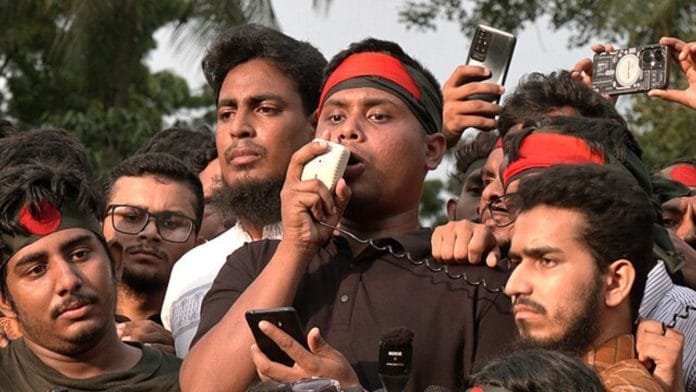New Delhi: The Foreign Correspondents’ Club of South Asia, Press Club of India and the Indian Association of Foreign Affairs Correspondents Saturday jointly expressed concern at the prevailing media landscape in Bangladesh, following the dismissal of five journalists from Somoy TV after protest by student leaders.
“Five veteran TV journalists were sacked in one of the largest TV channels after a prominent student coordinator of the Anti Discrimination Students’ Movement reportedly demanded their removal,” read the joint statement published by the three associations.
It added: “The veteran journalists were sacked on 22 December after Hasnat Abdullah took to social media and said that he had visited Somoy TV’s investors to ‘protest’. He claimed that the channel was ‘distorting’ his remarks and ‘campaigning for a fallen political party’.”
Abdullah is the convenor of the Anti-discrimination Students Movement—the platform credited with the ouster of Sheikh Hasina as the prime minister of the South Asian country in August this year. In statements reported by local media, Abdullah, without naming the Awami League, claimed that Somoy TV was promoting propaganda in favour of Hasina’s party.
Hasina, who faced student-led protests for two months between June and August fled Dhaka for New Delhi on 5 August, 2024, where she remains, as exclusively reported by ThePrint. Bangladesh has since been under an interim government, led by Nobel Laureate Muhammad Yunus as its chief adviser.
“We wish to remind the Interim Government in Bangladesh that it has been promising to uphold the principles of press freedom. Hasnat Abdullah’s visit to a TV channel’s newsroom demanding favourable coverage is nothing but news censorship and policing of information through the threat of mob action,” said the joint statement by the media groups.
The three associations also urged Somoy TV to rehire the five journalists who have been sacked, while calling upon Yunus “to uphold the rule of law”.
The five journalists, who have been dismissed are: Chief Input Editor Omar Faroque, Chief Output Editor Ariful Sajjad, Digital Head Kamal Shariar, Assistant Special Presenter Debashish Ray and Senior Reporter Bulbul Reza.
Faroque, in comments to the news agency AFP, said that the five were asked to resign for the “greater good” of the television station, following the threats by the student protesters. According to media reports, Abdullah led a group of around 15-20 students to the offices of City Group, an investor in Somoy TV on 17 December. Subsequently, the TV channel decided to dismiss the journalists.
Yunus has repeatedly called for freedom of speech and the press in Bangladesh. His office attempted to distance themselves from the incident, with Shafiqul Alam, the chief adviser’s press secretary stating that the responsibility lies with the decision maker, according to The Daily Star.
In September, the Committee to Protect Journalists (CPJ), in a statement, highlighted how four journalists, who produced coverage perceived to be favourable towards Hasina, have been detained by authorities since at least the end of August.
A number of journalists are facing probe, including by the International Crimes Tribunal—the domestic war crimes tribunal set up to investigate the perpetrators of the 1971 Liberation War—in connection with their coverage over the student-led demonstrations, according to CPJ.
In late October and early November, the press accreditations of several of these journalists were revoked by the Bangladeshi information ministry. Moreover, a number of news outlets in Bangladesh faced the ire of student protests following Hasina’s ouster.
In November, protesters besieged the offices of Prothom Alo, the largest Bangla daily in the country, and threatened to shut it down. Threats of closure against The Daily Star have also been made by protesters.
Furthermore on Saturday, the chief adviser’s press wing announced the suspension of the entry of journalists to the Bangladesh Secretariat, for “security reasons”, following a fire incident Thursday, according to BSS, the state-run news agency.
The government will begin a process to review the accreditation of journalists and invite new applications from domestic and foreign outlets for accreditation. In a clarification later in the day, the Home Ministry in Bangladesh clarified that the decision to suspend the entrance of journalists to the secretariat was “temporary”.
Also Read: Bangladesh dismisses MEA’s figure of 2,200 incidents of violence against minorities in 2024







@Shekhar G: It has already happened innumerable times in India for years-&-years, actually.
And are you admitting that India’s an imperial Power? Why should we care about Bangladesh’s internal affairs when we don’t want others to do the same to us?
Also.. Calling a random generalization of Powerless people a “cabal” is quite unhealthy for you. Unless you’re relying on Orwellian Humpty Dumpty semantics where the offshoot of RSS’ fountainship are “Left-liberal cabal”, now.
The Indian Left-liberal cabal would not speak a word on this. Nor would the likes of Owaisi protest.
But imagine the outrage if the same happened in India?